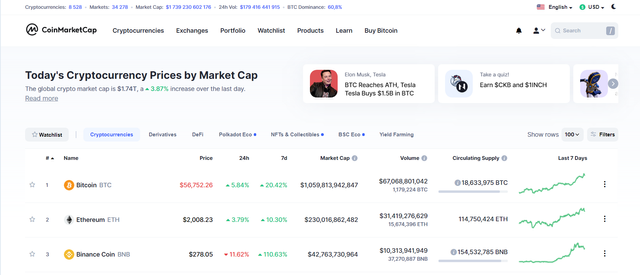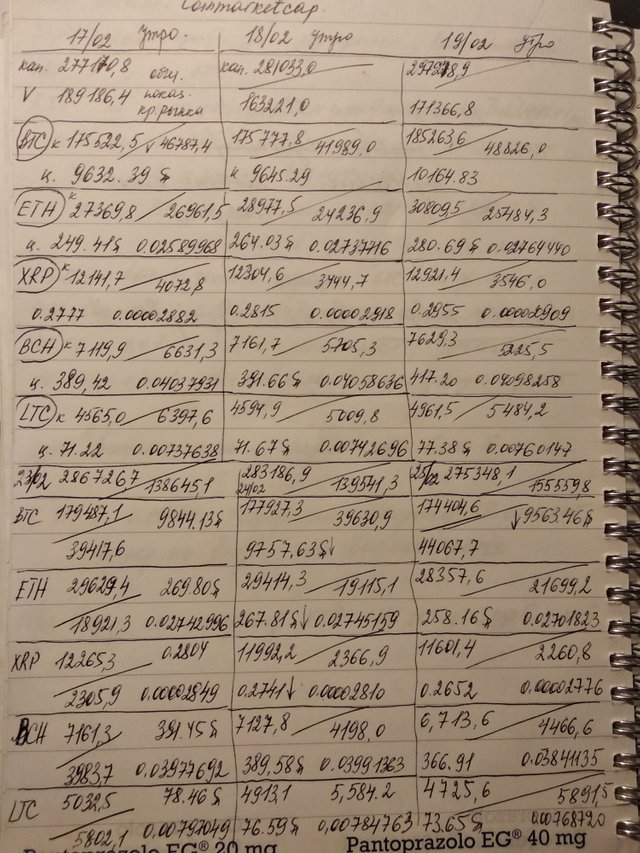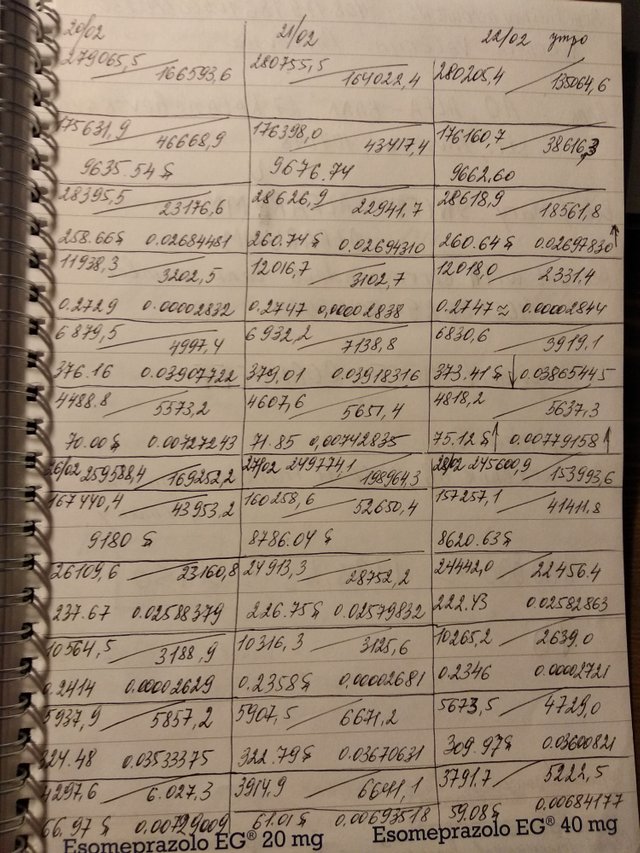Homework-Task 2 II Will You Keep Your Crypto Assets in a Wallet or on an Exchange? for @gbenga
Hello to everyone!
Today I present my homework for Professor @gbenga. His wonderful post about decentralized and centralized crypto exchanges can be found here: https://steemit.com/hive-108451/@gbenga/the-steemit-crypto-academy-week-2-cryptocurrency-exchanges-and-cryptocurrency-market-capitalization
Many centuries have passed since the emergence of such a concept as the "state", about which the philosopher Marcus Tullius Cicero truthfully wrote his famous philosophical treatise. And we are used to the fact that the state is a ruling and controlling body, whose laws must be obeyed by any citizen in any country of the world. No matter where we go, no matter what state authority we come to, we are required to submit our documents first of all.
And suddenly, in 2009, an unknown Satoshi Nakomoto, through coding the source code, was able to create a blockchain where you can be a completely unknown person. And no state body can find out who exactly is hiding under this or that nickname, who and where and for what purposes transfers their funds. How is it that the "State" does not know where a citizen transfers money? NOT an order, everything must be known and controlled. But thanks to the latest computer technologies, it has become possible to get out of the control of the state.
This is, in my opinion, the most important achievement of blockchain technology. And in the foreseeable future, thanks to the crypto industry, we will be able to find ways to be less controlled. Of course, it will take a long time, but there are already centralized and decentralized crypto exchanges. We cannot do without centralized exchanges yet, so we provide them with our documents, our address, our photos, to be a verified member and to be able to withdraw our funds to bank accounts and bank cards. We are still too dependent on money, so we can't live without it yet.
At the same time, the number of decentralized crypto exchanges and dApps is steadily growing, where there is no need to submit documents, just come up with a nickname and you have the right to perform all exchange operations. And I imagine it will take quite some time, and Fiat money will be replaced by digital, the cryptocurrency will be our routine and those cryptomnesia who was in the beginning of this road wins in time compared to those who did not even hear or understand how the world of cryptocurrency.
An important point was discussed by Professor @gbenga, where is it more correct to store funds in your wallet or on the exchange? I agree with the statement that we are mistaken when we think that we are the owners of our money, when we open deposits in commercial and state-owned banks. NO, friends, we handed over the money to the bank, so now the bank with its monetary policy manages our money: invests it in projects that it considers necessary, pays us 0.1% interest for using "our" funds, sets a limit on withdrawing "our" funds from bank cards, for servicing which we pay the bank a monthly fee...
If we make a projection on the crypto exchange, then this is exactly the same "bank" that saves us our money and we ourselves are fully responsible for placing our funds in the wallet of the crypto exchange. Of course, I agree with the professor's opinion that it is more correct and reliable to have your own wallet and store your valuable crypto asset there. This can be a variant of a cold and paper wallet, a hardware wallet. I am sure that the so-called "whales" use and store their crypto assets on such wallets.
Unfortunately, I do not have a large amount, so I act the old-fashioned way, my assets are stored in the wallets of 3 different centralized crypto exchanges. Thanks to the crypto-academy project, I will explore all the possibilities of using decentralized exchanges, various dApps, with a high degree of protection from hacker penetration, and transfer especially valuable capital to a wallet. I myself am interested in this, because there are also unscrupulous managers of individual exchanges, for example Livecoin.net those who have closed access to their accounts for their clients...
Another important point was discussed at the professor's lecture - the capitalization of the crypto market as a whole and for each individual crypto coin.
Capitalization is an important economic term that helps to assess the liquidity and value of any product, whether it is a crypto coin in the crypto industry or another asset in the stock market. The capitalization is determined based on the price of the asset at the time of valuation on the physical quantity of this asset.
For example, at the time of writing the post, the capitalization of the entire crypto market according to coinmarketcap was $1,739,230,602,176, an impressive figure since the existence of the crypto industry. It consists of the value of all-all crypto assets currently represented on all crypto exchanges where trades are held.
For example, BTC-capitalization of $1,059,813,942,847 = 18,633,975 BTC (qty) x $56,783. 02 (price)
Ethereum ETH-capitalization $230,448,074,785 = 114,750,424 ETH (quantity) x $2,010. 46 (price)
And if we go through each coin separately, then the results will form the same total capitalization of the entire crypto market at this point in time. This is important to understand, because capitalization is a variable that always changes. It can be higher or lower, and thanks to this indicator, we can judge the market, how valuable it is at the moment, how much money is invested in the crypto market, and the higher the capitalization, the higher the value of the market. And already for each individual crypto coin, you can draw a conclusion about its value.
Now I will show you my personal notes in February 2020, which I kept daily in my notebook, writing down the main economic indicators for cryptomonets (capitalization in the morning and in the evening, trading volume, price) that I had on the exchanges. This is how I evaluated their potential for growth or decline.
So see what the capitalization of the crypto market as a whole was from February 17 to February 28, 2020 from 277.1 to 297.2 billion dollars and did not rise higher. The price of BTC was on average $ 9600 and rose to $ 10164 (17.02.20) ETH cost from$ 249 - $ 280, LTC - $ 71 - $ 77. We conclude that BTC has grown almost 6 times, and ETH almost 9 times.
Thank you for reading my publication. I hope that I have completed my homework, if there are any comments, I will gladly take them into account and correct them in my homework.
Special thanks to @steemitblog @steemcurator01 @steemcurator02 for the very valuable and useful crypto-academy project on Steemit and for your support of our publications.
Russian text.
Приветствую всех!
Сегодня я представляю мою домашнюю работу для профессора @gbenga. С его замечательным постом о децентрализованных и централизованных криптобиржах вы можете ознакомиться здесь: https://steemit.com/hive-108451/@gbenga/the-steemit-crypto-academy-week-2-cryptocurrency-exchanges-and-cryptocurrency-market-capitalization
С момента появления такого понятия как "государство", о котором правдиво написал свой знаменитый философский трактат философ Марк Туллий Цицерон, прошло много веков. И мы привыкли, что государство- это властвующий и контролирующий орган, Законам которого должен подчиняться любой гражданин в любой стране мира. Куда бы мы не обращались, в какой бы орган государственной власти не пришли, с нас обязательно, первым делом, требуют представить наши документы.
И вдруг, в 2009 году, никому неизвестный Сатоши Накомото, посредством кодирования исходного кода смог создать блокчейн, где можно быть абсолютно неизвестным лицом. И никакому государственному органу не под силу узнать, кто конкретно скрывается под тем или иным ником, кто и куда и на какие цели переводит свои денежные средства. Как так, "Государство" и не знает, куда гражданин переводит деньги? НЕ порядок, должно быть все известно и подконтрольно. Но благодаря новейшим компьютерным технологиям оказывается стало возможно выйти из-под контроля государства.
Это самое, на мой взгляд, важное достижение технологии блокчейна. И в обозримом будущем, благодаря криптоиндустрии, мы сможем найти способы быть менее контролируемыми. Конечно потребуется еще много времени, но уже сейчас имеются централизованные и децентрализованные криптобиржи. Без централизованных бирж нам пока не обойтись, поэтому мы предоставляем им наши документы, наш адрес, наши фото, что быть верифицированным членом и иметь возможность вывода наших средств на банковские счета и банковские карты. Мы еще слишком зависимы от денег, потому жить без них мы пока не можем.
В тоже самое время неуклонно растет число децентрализованных крипто обменников и dAPPs, где нет необходимости представлять документы, достаточно придумать ник и вы вправе совершать все обменные операции. И я представляю себе, что пройдет совсем немного времени, и фиатные деньги будет заменены на цифровые, криптовалюты будут нашей обыденностью и те криптоэнтузиасты кто был в начале этого пути выиграют во времени, по сравнению с теми, кто еще совершенно не слышал и не понимает как функционирует мир криптоиндустрии.
Важный момент обсуждал профессор @gbenga, где правильнее хранить средства на своем кошельке или на бирже? Я согласна с тем утверждением, что мы заблуждаемся, когда думаем, что мы собственники наших денег, когда открываем депозиты в коммерческих и государственных банках. НЕТ друзья, сдали деньги в банк, значит теперь банк со своей монетарной политикой распоряжается нашими деньгами: инвестирует их в проекты, которые считает нужными, за пользование "нашими" средствами платит нам 0.1% интересов, устанавливает лимит на снятие "наших" средств с банковских карт, за обслуживание которых мы платим банку месячный взнос...
Если же мы сделаем проекцию на криптобиржу, то это как раз тот самый "банк", который сберегает нам наши деньги и мы сами несем полную ответственность за размещение наших средств в кошельке криптобиржи. Конечно же я соглашусь с мнением профессора, что правильнее и надежнее иметь собственный кошелек и хранить именно там свой ценный криптоактив. Это может вариант холодного и бумажного кошелька, аппаратного кошелька. Я уверена, что так называемые "киты" пользуются и хранят свои криптоактивы именно на таких кошельках.
Я, к сожалению, не обладаю большой суммой, поэтому действую по старинке, мои активы хранятся на кошельках 3 разных централизованных криптобирж. Благодаря проекту crypto-academy, я изучу все возможности использования децентрализованных бирж, различных dApps, с высокой степенью защиты от проникновения хакеров и переведу особенно ценный капитал на кошелек. Я сама в этом заинтересована, потому что есть еще недобросовестные руководители отдельных бирж, к примеру Livecoin.net, которые закрыли доступ к аккаунтам для своих клиентов...
Еще один важный момент был разобран на лекции профессора - капитализация крипторынка в целом и по каждой отдельной криптомонете.
Капитализация - важный экономический термин, который помогает оценить ликвидность, ценность любого продукта, будь то криптомонеты в криптоиндустрии или другого актива на фондовом рынке. Определяется капитализация из расчета цены актива на момент оценки, умноженного на физическое количество данного актива.
К примеру, на момент написания поста капитализация всего крипторынка по данным coinmarketcap была $1 739 230 602 176, цифра впечатляющая со времен существования криптоиндустрии. Она складывается из стоимости всех-всех криптоактивов, представленных в данный момент на всех криптобиржах, где проводятся торги.
Например, BTC - капитализация $1,059,813,942,847 = 18,633,975 BTC (кол-во) x $56,783.02 (цена)
Ethereum ETH - капитализация $230,448,074,785 = 114,750,424 ETH (количество) x $2,010.46 (цена)
И вот если мы пройдемся во каждой монете в отдельности, то из результатов сложится та самая общая капитализация всего крипторынка на данный момент времени. Это важно понимать, потому капитализация - это переменная, которая всегда изменяется. Она может быть выше и ниже и благодаря этому показателю мы можем судить о рынке, насколько он ценен на данный момент, сколько денег вложено в крипторынок и чем выше капитализация, тем выше ценность рынка. И уже по каждой отдельной криптомонете можно делать вывод о ее ценности.
Сейчас я вам продемонстрирую мои личные записи в феврале 2020года, которые я вела ежедневно в моем блокноте, записывая основные экономические показатели по криптомонетам (капитализация утром и вечером, объем торгов, цена), которые у меня имелись на биржах. Я таким образом оценивала их потенциал на рост или снижение.
Вот и смотрите какая была капитализация крипторынка в целом с 17 февраля по 28 февраля 2020 от 277,1 до 297,2 миллиардов долларов и не поднималась выше. Цена на BTC была в среднем 9600$ и поднялась до 10164$ (17.02.20) ETH стоил от 249$ - 280$, LTC - 71$ - 77$. Делаем вывод, что BTC вырос почти в 6 раз, а ETH почти в 9 раз. На мой взгляд, это два самых важных криптоактива, куда необходимо инвестрировать наши деньги.
Благодарю вас за прочтение моей публикации. Надеюсь, что я выполнила домашнее задание, если есть замечания, то я с радостью приму их к сведению и исправлю в моей домашней работе.
Особая благодарность @steemitblog @steemcurator01 @steemcurator02 за очень ценный и полезный проект crypto-academy на Steemit и за вашу поддержку наших публикаций.



Hello @vipnata, I read through your post and I must confess that you have a long post here but after reading through, it doesn't give an answer to the question asked neither does it add up.
You have done really well writing such a post but it is a NO for me.
Cheers!!
Профессор, спасибо за ваш ответ. Это значит, что мне ещё раз необходимо будет прочитать вашу лекцию.
Да, тебе понадобится мой друг.
Yes you will have to my dear friend
my post on Twitter:
@steemcurator02, thanks for your support!